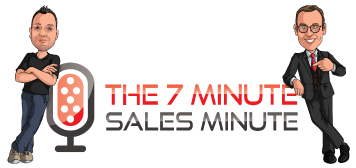
In today’s episode, Scott and Jon speak on the power of consistency. We give you a five-step easy to follow guide to adding positive consistency to help step up your sales game. As a bonus, enjoy the witty and consistently foolish banter of your lovable hosts. Hosts: Jon Dwoskin & Scott Fishman.
Read the transcript
Jon Dwoskin: Thank you for joining us for another episode of The Seven Minute Sales Minute podcast. Your bite-sized and easy-to-digest guide to jump-starting your sales career and putting you on the road to gaining more prospects, more clients, more business and ultimately more income.
Scott Fishman: Good morning, Jon.
Jon Dwoskin: Good morning, Scott. How are you?
Scott Fishman: I’m doing great today. How are you doing, man?
Jon Dwoskin: I’m doing great. I’m doing great. It’s a great morning. It’s beautiful out and I’m ready to have a great podcast for our listeners today.
Scott Fishman: All right. What are we talking about?
Jon Dwoskin: Today, I wanted to talk about, I know you did too. I’ll start the conversation. I want to talk about consistency. I want to talk about roller coaster syndrome that salespeople have. What I mean by that is, it’s so typical as we see and it’s happened to me and I know it’s happened to you. As salespeople, we start off really strong and then all of a sudden, like a roller coaster, would dip in and we have our ups, we have our downs, our highs and our lows. It’s really hard to enjoy and understand the fundamentals and the amazing feeling of really just living on the plateau.
Scott Fishman: Right.
Jon Dwoskin: This was really driven home to me many, many years ago. I think I read this book 10 years ago, book by, a guy by the name of George Leonard, and he wrote a book called Mastery. In it, he talks about enjoying the plateau, because that’s where life is the easiest. I want to talk about that today. Not necessarily about the book, but I want to talk about the philosophy of getting away from the roller coaster syndrome and into the plateau of fundamentals.
Scott Fishman: I hear you. That actually reminds me of something I always go over with people that I’m mentoring. I say, “Don’t let your highs get too high and don’t let your lows get too low.” If you have a great sales week, don’t pop bottles. You’re not a superstar.
Jon Dwoskin: Right. High five.
Scott Fishman: Right. Exactly. If you have a crappy week, you either are not trying to check to see if the window is open so you can jump out. Just live in the middle, on a plateau like you said.
Jon Dwoskin: That is the most consistent way of growing your sales. Really, the theme of today is consistency. It’s much better to have a consistency in your day. A consistency in your own personal methodology and a consistency in how you attack sales. If you look at … Another one of my favorite books is The Compound Effect, by Darren Hardy. If you just take take a look at all the little things you do on a daily basis that compound overtime. Consistency is the key that gets that engine going. I want to give our listeners five things. Get your pens and papers out. Five things to think about to have consistency in their day.
Scott Fishman:; Okay. Let’s hear them.
Jon Dwoskin: On a side note, I’m also going to challenge myself, because as I’ve been listening back … which … I think is a really good tool for people to always record their phone calls and listen to themselves, I’ve noticed that I say the word right about a thousand times during these podcasts. I’m going to challenge myself, and tell me if I say the word right, because I’m not going to try not to say it. For those of you listening. Listen to the words that you say that you don’t even realize you say.
Scott Fishman:; Maybe we can make a drinking game out of this Jon.
Jon Dwoskin: It’s a little early for that and I don’t drink. Maybe if it will break my habit, maybe I’ll do it.
Scott Fishman:; Our listeners can do it. I shot every time we say right.
Jon Dwoskin: Five things to keep in mind for consistency. Number one, it’s so common for new sales people when they start to pound the phones, have a ton of energy. They don’t care necessarily if they know what they’re talking about and they’re just dialing for anything that they can get. As they get busier, the calls drop off and sometimes salespeople will go two, three, four weeks without even making a cold call. Rule number one is cold call a minimum of 20 or 30 minutes a day. Pick one, 20 minutes or 30 minutes. Don’t worry about the number of calls you make. Don’t worry about the length. Just pick a time whether it’s 20 or 30 minutes and call that amount of time every day. Of course, you can do a lot more. Again, we’re talking to the salesperson that’s inconsistent and trying to become consistent. Twenty minutes every day is a lot better than three hours at a Monday and then you don’t call for a month.
Scott Fishman: It makes a ton of sense and I think I’ve seen it in my own career quite a few times where I get busy servicing clients and dealing with clients that are in process and I forget to backfill. As soon as those clients close, I’m, “Where are all my clients?” I got nothing for a few days, and then I have to go, get back on that treadmill and do that three-hour Monday. Whereas if you do 20 minutes a day, it actually works.
Jon Dwoskin: I said the word right, but yes. You get in that. I can’t help it. I’m going to say the word right. You get into that roller coaster and that’s what we’re trying to avoid. In the middle. Number two, role play every day. Not role play every day. Role play twice a week. Role play for 20 minutes twice a week with one of your colleagues, with somebody you know or somebody who you know knows more than you or your boss or somebody within your organization or even somebody outside of your organization that will role play with you. Role play sales. Role play objections. Role play tough situations that you were in that week. Grow your skills so when you have the next call, you’re just a little bit more prepared.
Scott Fishman: That definitely makes a ton of sense. One thing I do challenge you on that a little bit is sometimes I think role play with someone that doesn’t know a thing about your industry. If they can’t follow what you’re saying, then obviously you have to “dumb” what you’re saying down a little bit because you want the lowest common denominator to know what you’re saying. When you say it with someone who has no clue about your business and they could follow you, you’re a winner. You got it.
Jon Dwoskin: That’s a great point. That’s a great point. Number three, have three metrics that you track every single day. It’s so important to be able to measure what we do on a daily basis especially at salespeople. The three metrics, you can pick whatever you want. I’m going to suggest and I’d like to hear what you suggest. Track the number of calls, the number of meetings, the number of proposals you have done and then how you’re converting those is key. Obviously, we want to close. You can make a lot of calls to a lot of proposals, have a lot of meetings, but if you’re not converting those, then that’s not necessarily going to mean anything. You want to know how many calls it takes to make a meeting. How many meetings it takes to get a proposal. How many calls. Sometimes people do phone sales it takes to get a proposal or a deal. You want to know your metrics. Pick three and live by them.
Scott Fishman: Once you have those key performance indicators down, your KPIs, at that point, now you know which ones to move. Where your lever is. If you’re converting one out of every two people you talk to into a meeting, then that’s going to be the thing that you need to do is just talk to more people. If it’s one out of every 10 that you talk to, then maybe you need to work on your meeting skills, on your presentation, so that way you can convert more of those. Obviously, those are worth more. Really, you have to find which one of your KPIs has the most leverage and utilize that and work on that. When you get that down, switch to a different KPI. Always follow the same metrics. It’s good. There’s consistency. There’s value and consistency.
Jon Dwoskin: Well said. On your point, the next … I think number four is have weekly meetings with your boss and/or mentor. Where you sit down for anywhere between 30 and 60 minutes and you’re going over those metrics. They’re pushing you. They’re holding you accountable and it’s a consistent meeting on a weekly basis. They’re really highlighting certain things that you need to focus on.
Scott Fishman: Yeah. Absolutely.
Jon Dwoskin: Number five. This is really important and this is going to seem like it’s not important. It’s going to be easy to not do. If you consistently do this, it will save you a ton of time and it will make you a lot of money and the consistency of it will keep you a lot tighter and make all of these a lot easier. That is, consistently, before you leave the office at the end of the day, clean up your day, clean out your e-mail box, send out any e-mails and follow-up work and prepare yourself for your next day. Go over your calendar and make sure everything is in line and just prepare, because a lot of times people will not do that. They come in the next morning, they start their day 8:00 AM, maybe 9:00 AM. By the time they’re done cleaning up, it’s 10:00, 10:30, and you’ve wasted an entire morning.
Scott Fishman: You’re absolutely right. Compartmentalizing the day before and being ready for the following day makes a ton of sense, because when you come in and you’ve got a plan ready to go. Even if you didn’t put a plan on paper but you know what you need to do and you’ve finished out your day properly. The next day becomes that much easier. You don’t have that e-mail waiting for you that gets you flying, gets you all pissed off, gets you all angry, or gets you excited for no reason. You want to make sure you that you are planned for the right thing.
Jon Dwoskin: As salespeople, to have all these swirling around in your head all night and all the deals that you’re working on and all of the issues that arose throughout the day. It gives you a space to just put it to rest and worry about it tomorrow because it’s organized and it’s packaged for you to pick up quickly the next morning.
Scott Fishman:; Right. There, I said it too.
Jon Dwoskin:; There you go. Right. Right.
Scott Fishman: Jon, this actually … When we talked about this topic, I thought about something that I … There’s this old Reebok commercial and it always resonated with me. It was a quote by Ralph Waldo Emerson was, “A foolish consistency is the hobgoblin of little minds.”
Jon Dwoskin:; I like it.
Scott Fishman: I always thought that was about the guy who was just doing the same thing all the time. He was just status quo. Had the same haircut as everyone else. Had the same clothes as everyone else. Did the exact same things because he was just a sheep. I lived by that for a long time, and then when we start talking about this episode, I thought to myself that maybe I don’t have to live by just doing something different just to be different. I think there is value in consistency. You don’t need to say the same thing on every phone call. If you have 5 to 10 different go-to phone calls that you can use in your repertoire and you know you’re using those consistently, then you’re not just doing the same thing every single time. Consistency does not just mean making the left turn every single day at the exact same spot. It means sometimes making three right turns to make that left, but you’re still actually doing the same thing.
Jon Dwoskin: I love that you said that. I love the quote and it’s … Consistency just in another form is, it’s not being robotic. It’s just being systematic. If we have the proper systems in place and the proper processes in place for ourselves, then we still have to be ourselves, have our own voice, but we’re putting a little bit of structure in place to have consistency.
Scott Fishman: We were actually talking about this this morning. Something. We talked about the whole consistency play is having bite-sized goals. You’re not just talking about one big giant goal that is there, like you’re staring at a mountain. If you take it one step at a time, you’ll make it up that mountain. Having consistent goals that are bite-sized will get you to where you need to be.
Jon Dwoskin: Also, bite-size is so important because as salespeople, it’s so hard to feel accomplished at the end of the day. We’re always running uphill and we need those measurable feelings of accomplishment that we can do it. The bite-size goals give us that.
Scott Fishman: To sum it up. One big last final piece of consistency that we would love to see all of you take advantage of is once a week listen to The Seven Minute Sales Minute podcast.
Jon Dwoskin:; That’s a great thing to do consistently. I love it.
Scott Fishman:; All right. Great.
Jon Dwoskin:; Thank you very much folks. Have a great day. Thank you for listening to this episode of The Seven Minute Sales Minute. For show notes and worksheets pertaining to this week’s show, check us out at the sevenminutesalesminute.com. Take today’s strategies and run with them. Increase your sales and increase your income.




